[Original posted in Hatena Blog by Kazuto KANAOKA, 2020 Public Relations Intern (March 29, 2021); Translated by C. Rosenberg]
Hi everyone! I’m Kanaoka, a public relations intern at JVC!
In our sixth interview of our 2020 cycle interns, we selected Tara Sato, who like our previous interviewee Yuna Tamamura, is an intern on the Korea Children Campaign!
Tara is always so cheerful and full of energy! Since she was little, she’s been participating in the Korea Children Campaign; we interviewed her about many things, including how it feels to be on the promotional side of our activities.
Let’s take a look at her answers!
First of all, could you introduce yourself and tell us what you’re learning in college?
I’m Tara Sato, and I’m interning for the Korea Children Campaign. I am a sophomore in the French Literature department at my university. At my college, French language and literature are separated; I’m attending classes in the literature department. Since I’m only a sophomore, I haven’t decided the specifics of my major or concentration.
Have you been interested in French literature for a while?
Up until college, I was mainly interested in East Asia, so studying it took up a lot of my time. This made me think about branching out and studying other regions — after all, I’ll only have so much leeway to immerse myself in my studies while I’m a student. That’s when I decided I wanted to learn more about French culture, so I declared it as my major. Until now, I’ve been involved in a lot of cultural exchange programs that really resonated with me, so I thought it will be valuable to learn about French culture and France’s future through French literature.
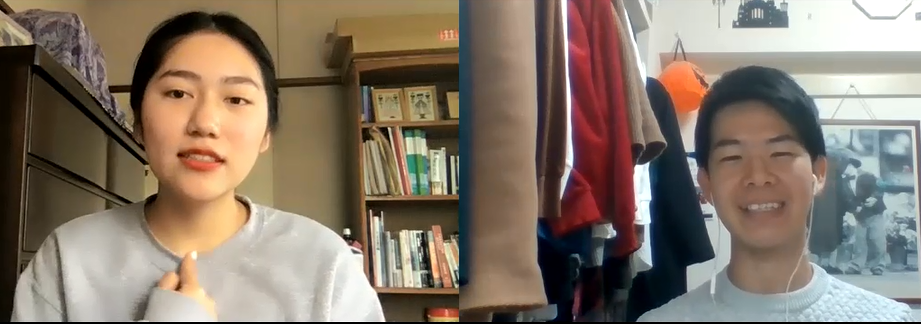
The very beginning of our interview!
Unfortunately, I don’t know much about French literature — could you tell me about what differentiates it from other genres?
French literature is incredibly rich in emotional expression. From delight to sorrow, all the emotional expressions are written with very realistic nuances. I really like that in every situation, it does not feel like only one emotion is being portrayed; this gives each work a realism that feels similar to the world we live in. Likewise, French films often have no music, but instead natural sounds like rain, which makes emotional transfer easy. These aspects of French literature and films, like how the expressions are faithful to emotion, really resonate with me. Because of that, I find it easy to become immersed in these works.
What piqued your interest in international cooperation?
I’m not sure at what point I became interested in international cooperation; it happened before I knew it.
One could say that international cooperation and NGOs are my life itself. My mother works for an NGO, and I’ve been going to see her work ever since I was little. When I was in my fourth year of elementary school, I was invited to participate in the Korea Children Campaign’s “Tomodachiten” (“friends’ exhibition;” an art exhibition initiative that displays art by children from North Korea, South Korea, and Japan). From then, every year for five years, I participated in workshops run by Corporation Okedongmu Children in Korea (JVC’s partner for children’s art exhibitions).
Also, when I was in in my third year of junior high school, I had an opportunity to write about these workshops in a piece about human rights since that was the theme for a summer writing assignment. I think that this assignment allowed me to gather my thoughts about the topic and reflect on what I can and want to do for international cooperation in the future. Luckily, I was also able to receive an honorable mention from a national competition with my writing.
Looking back, I think that I was able to have a purely fun time with all those people with different backgrounds because I was a child. I continue to help with these initiatives because I want the next generation of kids to be able to have experiences like the ones I was able to have, and I also hope to give back to this organization that helped me have such a great time.
Just when I entered college and was thinking about becoming more deeply involved with JVC’s activities, I found out about the internship program. With the hopes of participating in a variety of events and telling the world about my own experiences and reflections of those experiences, I decided to become an intern here at JVC.
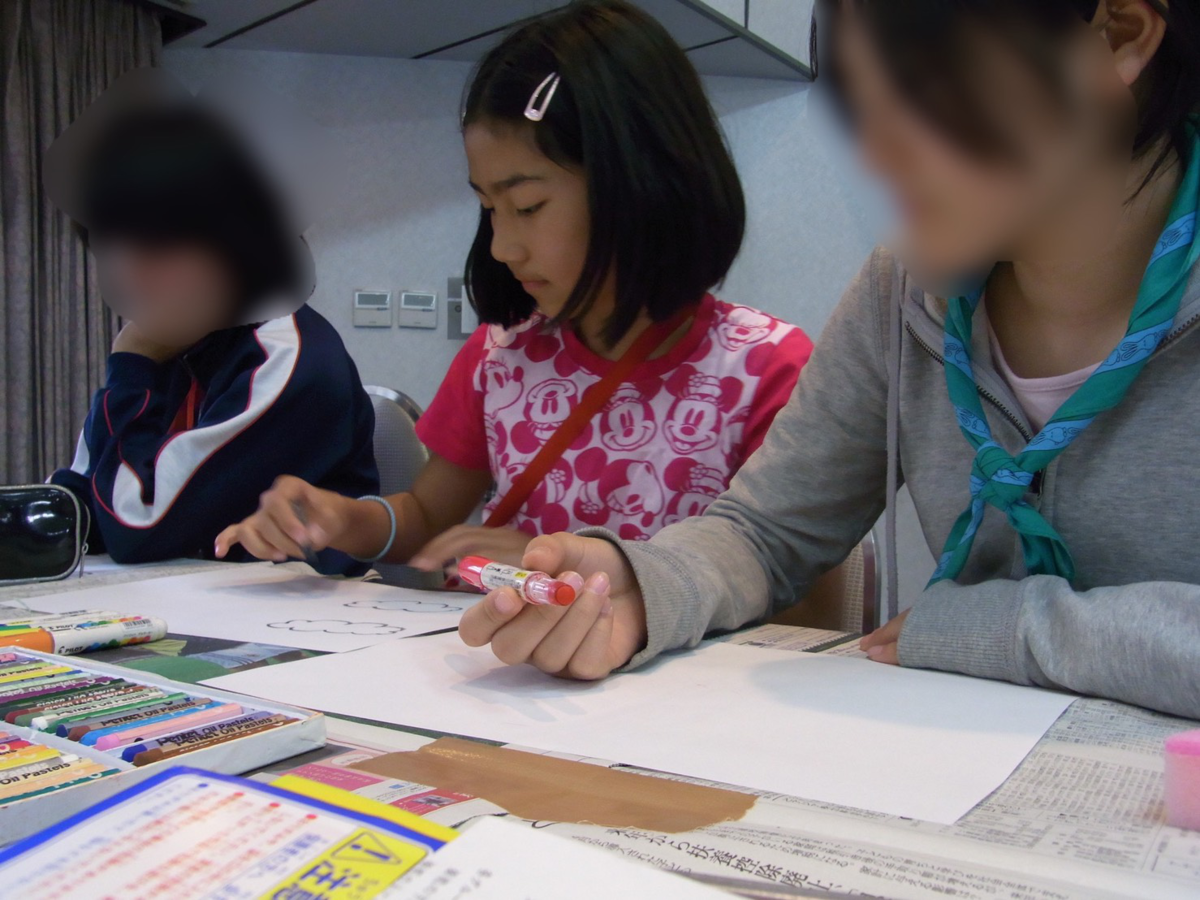
A picture of Tara when she participated in “Tomodachiten” (a Childrens’ Art Exhibition).
What kind of work do you usually do?
Due to the COVID-19 pandemic, the childrens’ art exchange events were moved online. I helped in the preparations for this move. I also wrote blog posts about my experiences with the childrens’ art exhibitions. I really enjoyed broadcasting about the valuable experiences and many reflections I was able to make during this time to so many people.
I was also able to participate in the study groups with the college student program; I had opportunities to speak with the guests and teachers there and write blog posts about what I heard from them and my thoughts about the contents of their presentations.
What did you learn through this internship? What are your thoughts about it?
I was really happy to be working in the same job as those who helped me so much when I was a child. I hope that I make the same positive impression on them as the volunteers I met when I was little. Through my work at the childrens’ art exhibitions, my blog posts, and the icebreakers at the workshops, I’ve enjoyed serving as a bridge between the children and adults in the activities.
Is there anything else you would like to do while you are still an intern?
Unfortunately, my time as an intern here has come to an end. As for what I plan to do with my time now that it has ended, I hope to use my experiences as a base to communicate new perspectives to a broad audience.
Even if it’s just one conversation with a friend, if I keep thinking about those perspectives as we talk, I think that both of us will be able to enter the workforce with many ideas in our arsenal. If we keep talking about all these perspectives, I think that we’ll be able to create a society that is easier to live in for the next generation.
It sounds like you really enjoy working with children. Do you have a specific experience that caused you to have such strong feelings about working with them?
From my experience, I can say that it is important that children are aware that their friends may have different cultural and traditional backgrounds than they are. On top of that, I think it is also important that they are aware that even their close friends who live near them are also different from them.
That is because when encountering different conversation topics, such as the positive and negative aspects of another country, those friends will come to mind, and they can stop and think clearly about the stereotypes and prejudices that might be at play.
Growing up with these people around makes it easier for children to notice the prejudices and discrimination that exist around them, and to think about why people discriminate and what they themselves can do about it.
I think that while adults are held back by hesitation and concern about the opinions of others, since children are so innocent, they can enjoy becoming friends with people from other cultures while also deepening their understanding of that culture.
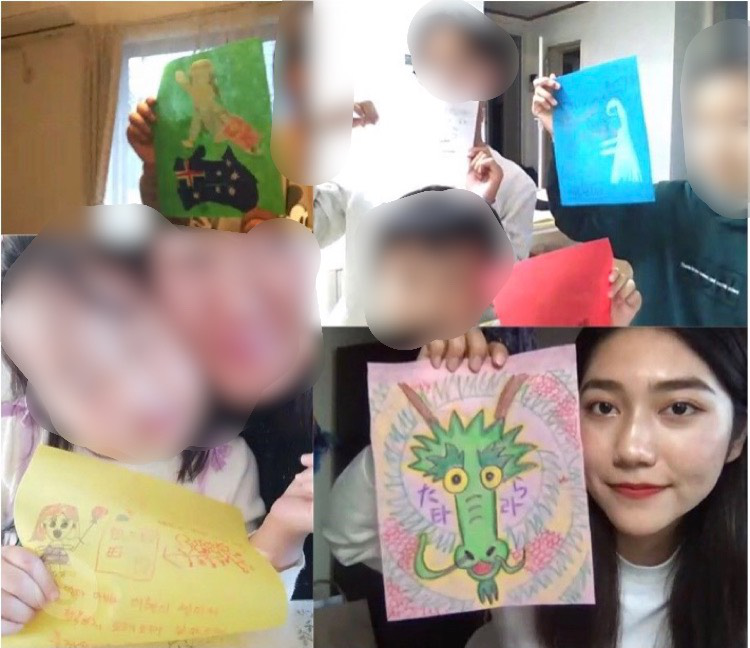
A picture from the workshop.
It’s definitely important to know from childhood that there are a diverse range of people! How do you think it is best to deal with people who use discriminatory language?
I do my best to figure out why the person thinks in such a discriminatory manner through conversation.
By speaking from my own experiences and about my friends, I try to explain that you can’t understand a whole group of people by generalizing that group. Through my explanations and anecdotes, the person may realize that there are many others who think the same as I do.
Through sharing these experiences first, I can show to them that I am taking our conversation seriously. Hopefully this will lead to us becoming closer, and we can share our thoughts respectfully while discussing such discriminatory language.
If even after this we can’t reach a mutual understanding, that just makes me want to know even more why they think the way they do. Within their thought process, there is a fundamental issue; the inability to reach mutual understanding may be a hint to unlocking the path to both mutual understanding and the issue itself.
After the discussion, I hope to also think about my own implicit biases.
This might be a difficult question, but do you think that people who can’t accept diversity should be categorized as diverse?
The environments that people grow up in are different, and just like everyone has different personal traits, of course everyone will have different ways of thinking. Even if you have a bad impression of the way others think about diversity, if you accept and respect other specific things, that also counts as a type of diversity… right?
I think that probably even on the side of those who respect diversity, there should be some flexibility. When many cultures are mixed, it can be fairly lonely to lack representation. I think that it’s also important to establish one’s own personal identity.
If I am in a diverse environment, it may take me some effort to come to understand it, to the extent that I can.
Compromise is important, but there are some things that can’t be resolved by taking the middle ground. For example, people from overseas who visit Japan are often annoyed by the sound of people loudly slurping noodles, which is accepted here. Do you think that the statement “when in Rome, do as the Romans do” holds true?
It depends on the time and place… if it’s just the sound of someone eating, I think they should be able to put up with it. They might even enjoy trying to be louder when they eat.
I think that someone’s ability to accept the manners and culture of another person depends on where they are and what kind of relationship they have.
It is always important to make efforts to understand others. Trying to accept them and thinking about to what extent you can accept the words they use can be some great food for thought.
I heard you’ve worked many different part-time jobs! It seems like you have a great can-do spirit!
I like talking to people and hearing their diverse perspectives, which probably makes me good for customer service roles. Right now, I work at an izakaya (Japanese bar restaurant). It’s been a lot of fun getting to know the regulars; it’s more work than I expected, and incredibly rewarding.
Since I like talking to people so much, I try to do so even outside of my part-time jobs. Before the pandemic restrictions set in, I would get off the train at stations I didn’t know and try going to hidden izakaya in the area.
Speaking of a can-do spirit, when I was in high school, I wondered if I could walk forever if I just didn’t think about how tired I was. I tried walking until I hit an absolute limit. I walked about 15 kilometers from Fujisawa to Yamato station of Odakyu line, and then went to my part-time job. Of course, I knew that it would make me tired (lol) but testing out random things like that made me very happy.
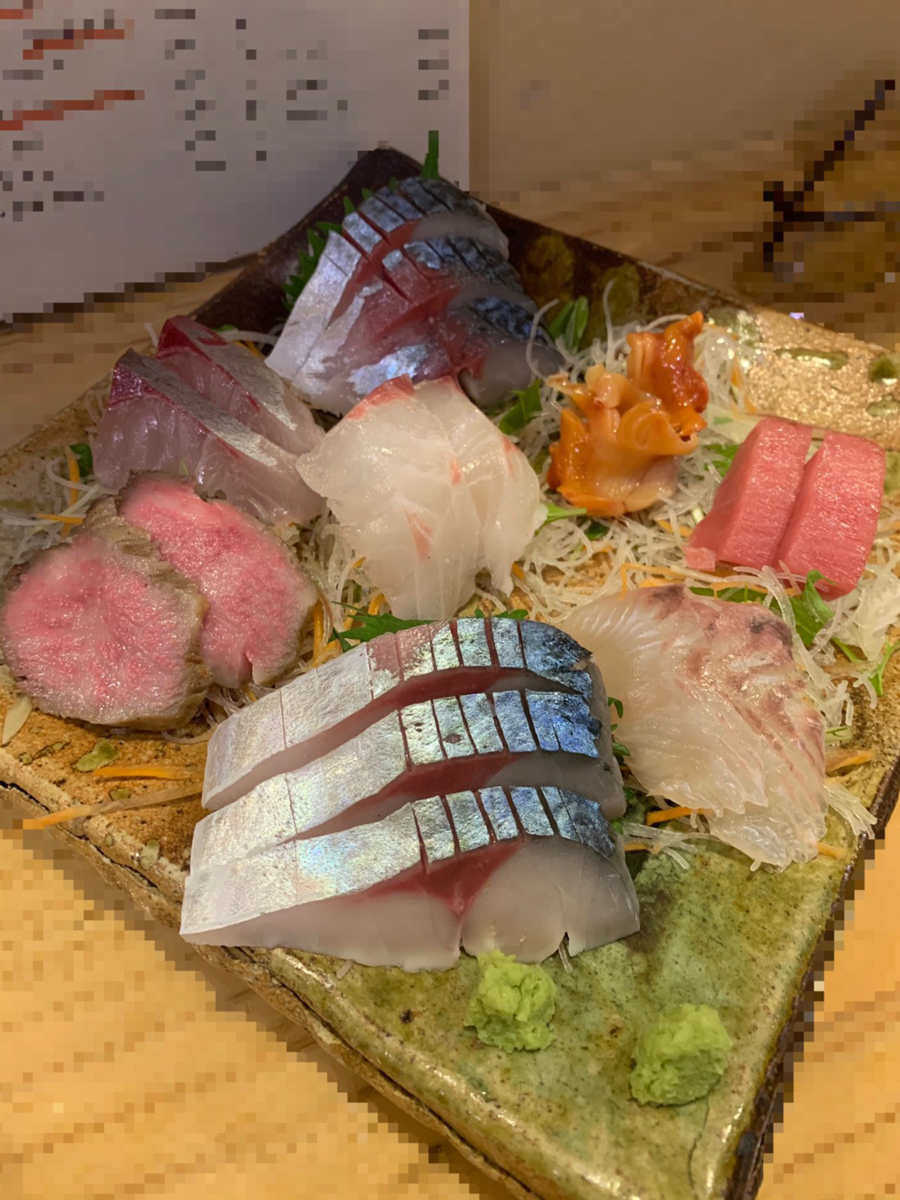
Some delicious-looking sashimi from Tara’s longest-continuing part-time job.
So, you’re fine working alone?
Yes. I really enjoyed quarantine. I tried drying mackerel using the bunkaboshi method (drying fish by wrapping them in cellophane), did a lot of knitting and embroidery, and watched so many movies. It was a lot of fun to be able to do what I wanted whenever I wanted to.
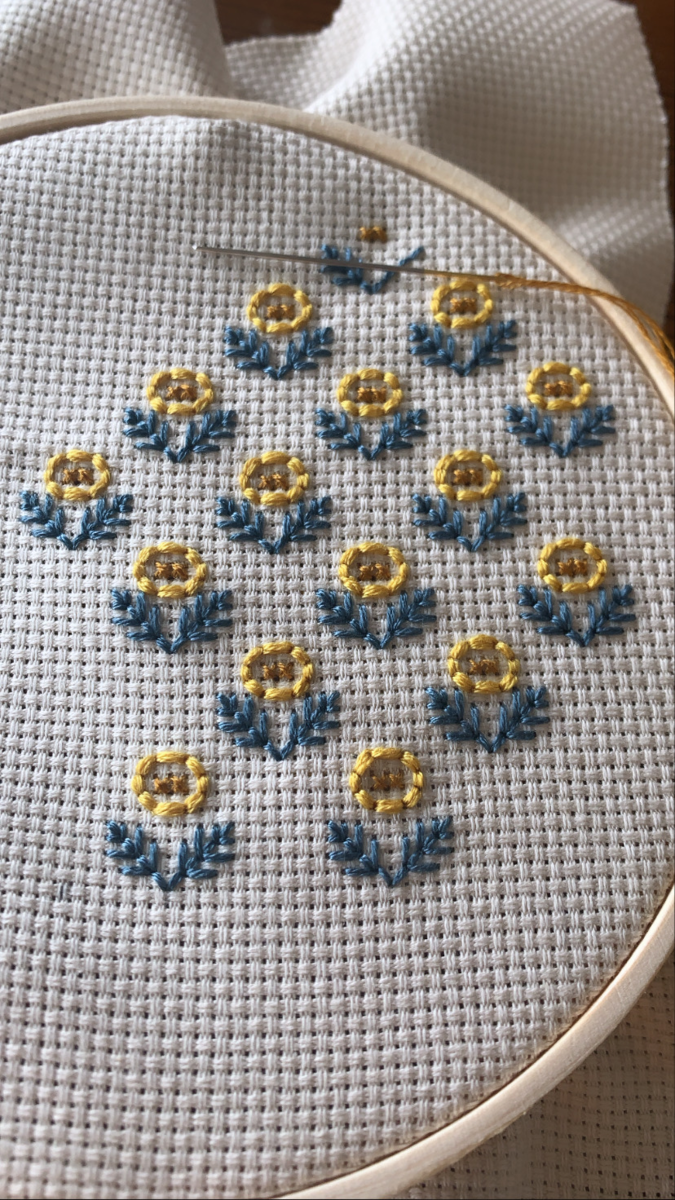
A picture of Tara’s embroidery. It’s so cute!!!
Do you ever feel down?
After I entered college and began to explore French literature, I always thought it was beautiful because of how it so honestly portrays the full range of human emotion. I feel that that full range of human emotion itself is beautiful. I’ve been more apt at honestly expressing myself to others partially due to French literature.
That sentence — “the full range of human itself is beautiful” — what a nice expression!
Right? Even times when I’ve been angry, when I look back a few days later, I’ve been able to realize that even that angry time can become a good memory. At night when I’m in bed, I like to think that since I can enjoy such peaceful time in bed now, that day must’ve not been too bad (lol)
Especially now due to the quarantine lifestyle making the range of activities I can do smaller; I think I’ve been able to appreciate learning the extent of my emotional range.
Still, I feel that there’s a silent understanding among the others around me that one should not express 100% of one’s emotions. But I think that if we were able to honestly tell others our emotions, we would be able to understand each other so much more deeply.
What do you try to prioritize in life?
I try to never think too negatively about things. If I’m able to think positively about life, even if something unfortunate happens, I can close the book on it as just another experience. In life, there are unpleasant and exhausting things, but the ability to categorize even those as good experiences has allowed me to become the person I am today.
Also, I prioritize making an effort to have leeway in my everyday activities and to create an environment that I can rest in. My answers up until now must make me seem like I’m such a positive person, but of course there are times I will think negatively. But I think that sometimes if I rest for a bit, it’ll feel like the bad things never even happened.
Even if I can’t leave my home, I can have fun and relax just by sunbathing or even just by watching the clouds pass by!
What are your hobbies?
I like to enjoy things with all five senses. My favorite thing to do is to listen to music, sunbathe, and drink something delicious while spacing out all at the same time. Depending on the day, I’ll put on some perfume or open the window to let some air in to enjoy the outside smells. It might be weird to call that a hobby, but I like to do this to relax.
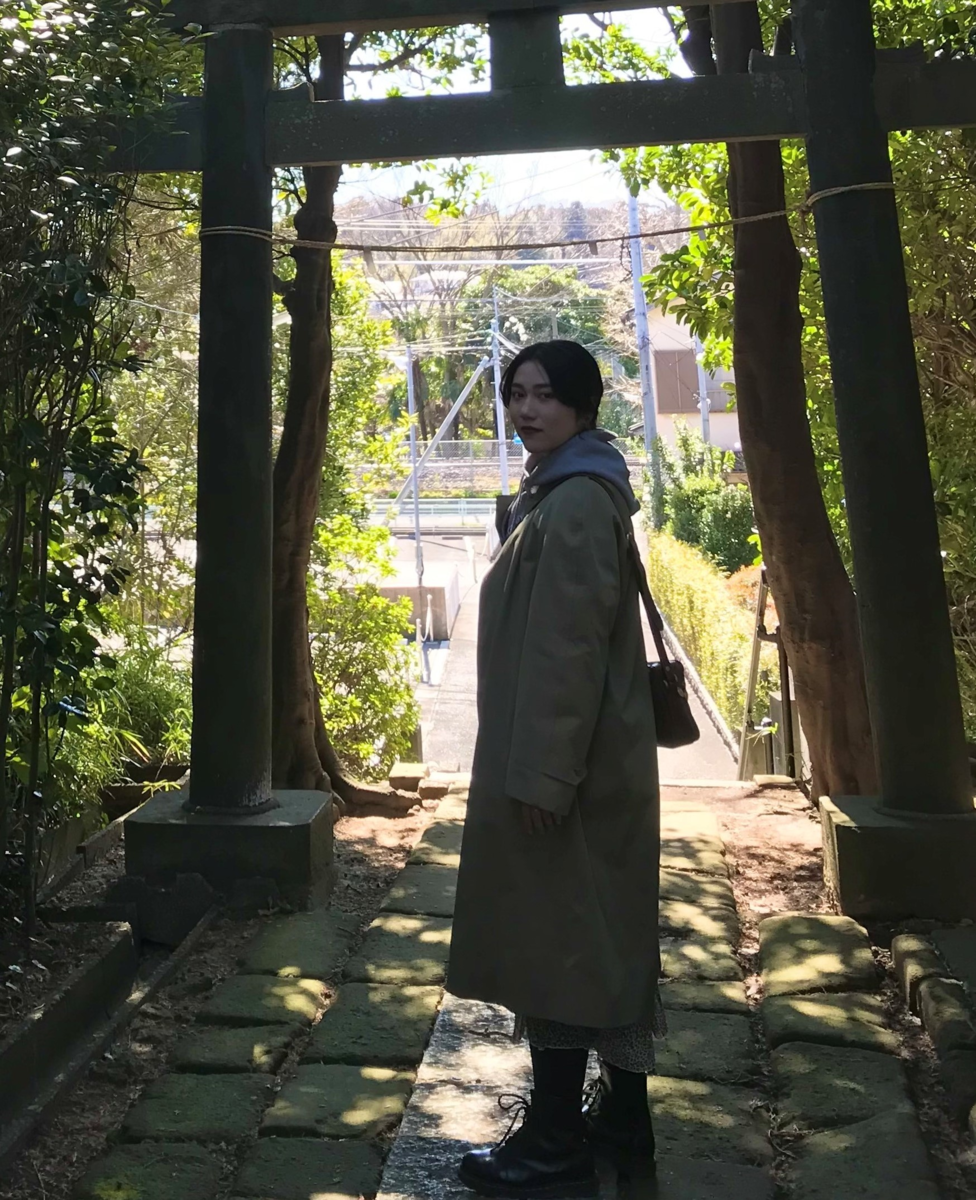
Another of Tara’s hobbies: taking walks. This is a shrine she often walks to.
If you think about enjoying with all five senses, that can open up a lot of new possibilities for fun things around you!
Well, speaking of that, I try to make every place in my room enjoyable to look at. I can enjoy myself just by looking at the titles of books on my bookshelf (lol). I like to space out and just reflect on my life so far.
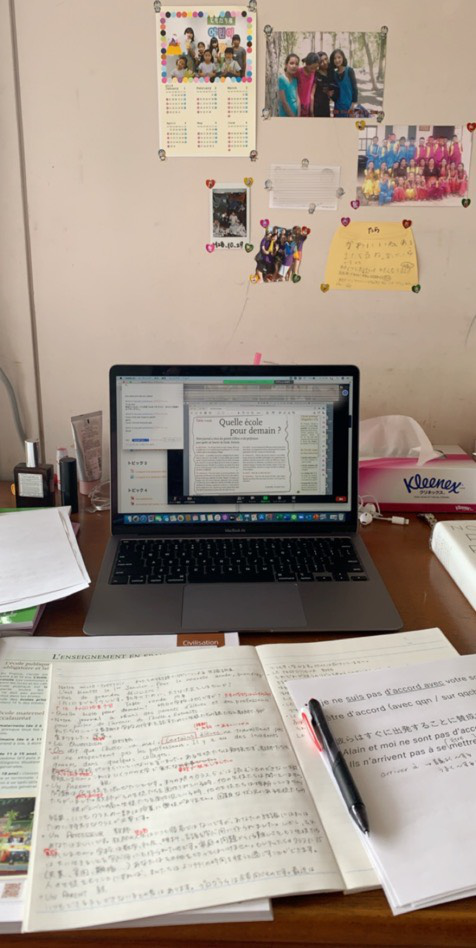
Tara’s desk, covered in things she loves. Looking closely, it seems like she might be studying some French literature…?
What would you bring to a deserted island?
A mirror! I need it just in case something got stuck in my eye or something (lol). I think it’s important to realize that you can’t see the seeing part of your body (your eyes).
I think that uneasiness can be the worst thing that can happen to someone, so if I can confirm that I am okay using a mirror, I think I’d definitely calm down.
Also, when you need to call for help, you can reflect light using the mirror. And if an animal comes to attack, it could be useful (lol).
And finally…
Thank you for reading to the end! This was the last of our 2020 intern interviews! I’m super relieved that we’ve been able to successfully interview all the interns for this year (lol)
Through these interviews, we’ve explored how this internship has affected the interns’ feelings and values, and even reflected in their daily lives.
If through reading these articles, you’ve become even a little interested in JVC, I think they were definitely worth writing! Thank you to those who have read this for a whole year!
Until next time!
Share This: